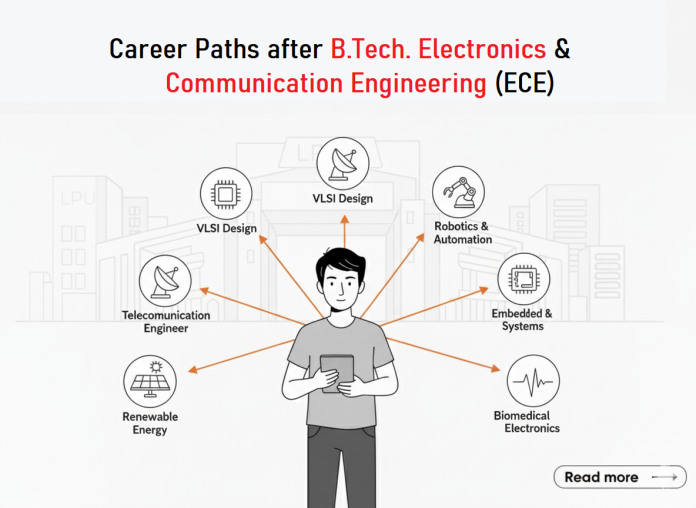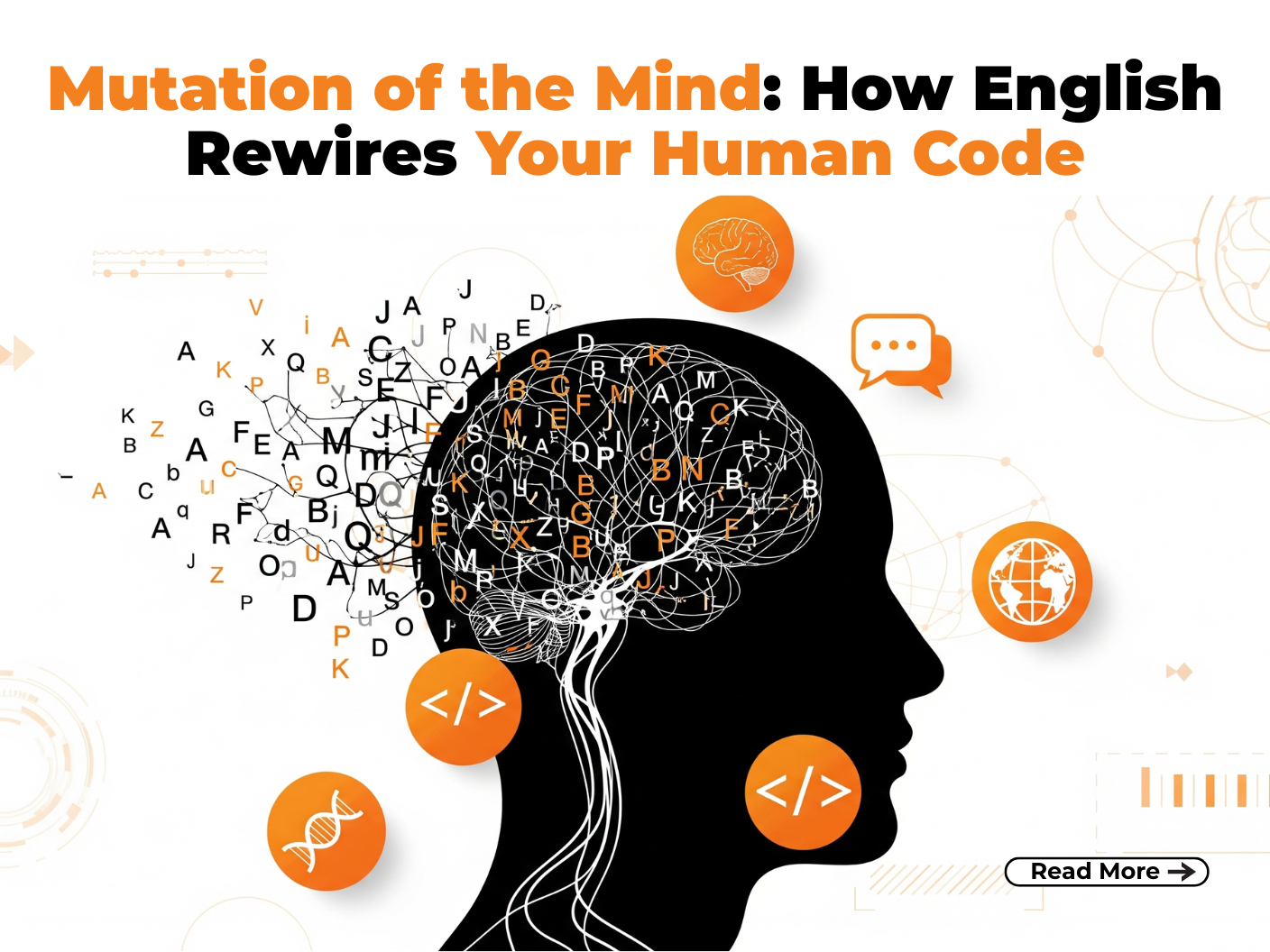- Introduction
- What Is the Scope of B.Tech. Electronics and Communication Engineering (ECE) in Today’s Industry?
- Why B.Tech. Electronics and Communication Engineering (ECE) Is a Smart Career Choice Today?
- Specializations You Can Choose in B.Tech. Electronics and Communication Engineering (ECE)
- Key Skills to Succeed in B.Tech. Electronics and Communication Engineering (ECE)
- Career Options After B.Tech. Electronics and Communication Engineering (ECE)
- Scope and Salary Trends for B.Tech. Electronics and Communication Engineering (ECE) Graduates
- Top Recruiters That Hire B.Tech. Electronics and Communication Engineering (ECE) Students
- What After Graduation? Higher Studies & Certifications
- Top Government Exams and Career Opportunities After B.Tech. Electronics and Communication Engineering (ECE)
- Final Thoughts
- Frequently Asked Questions (FAQs)
Introduction
Electronics and Communication Engineering (ECE) is one of the most dynamic and fast-growing fields of engineering. It deals with the design, development, and application of electronic devices and communication systems from smartphones and satellites to robotics and the Internet of Things (IoT).
A B.Tech. Electronics and Communication Engineering (ECE) is an undergraduate programme that blends principles of electrical engineering, electronics, and computer science with specialized training in communication systems.
Pursuing a career in ECE opens doors to multiple industries, including telecommunications, consumer electronics, embedded systems, defence, IT, AI/ML, and automation. ECE professionals are in demand for their ability to build, maintain, and improve systems that transmit data securely, efficiently, and globally.
The rapid growth of emerging technologies like 5G, IoT, smart devices, and AI ensures that ECE careers remain not only relevant but also future-proof, with vast opportunities in both the public and private sectors, as well as in research and innovation.
Career options after ECE-
| Career Path | Roles/Titles | Top Recruiters |
| Core Electronics | Embedded Systems Engineer, VLSI Engineer, PCB Designer, Hardware Engineer | Intel, Qualcomm, Texas Instruments, NXP, Samsung |
| Telecommunication | Network Engineer, RF Engineer, Telecom Engineer, Signal Processing Engineer | Airtel, Jio, Ericsson, BSNL, Cisco |
| IT & Software | Software Developer, System Analyst, IoT Developer, AI/ML Engineer | Infosys, TCS, Wipro, Accenture, Cognizant |
| Emerging Tech | IoT Architect, AI/ML Engineer, Robotics Engineer, Automation Specialist | L&T, Bosch, Tech Mahindra, Startups |
| Higher Studies / Research | M.Tech, MS Abroad, MBA, PhD | IITs, NITs, Foreign Universities, IIMs |
| Entrepreneurship / Startups | Tech Startup Founder, Product Designer, IoT/Embedded Innovator | Self-employed / Accelerators / Incubators |
What Is the Scope of B.Tech. Electronics and Communication Engineering ( ECE ) in Today’s Industry?
The scope of B.Tech. Electronics and Communication Engineering in today’s industry is broad, dynamic, and future-focused, given the rapid advancement in digital technologies, automation, and global connectivity.
Electronics and Communication Engineers are essential in designing, developing, and maintaining systems that enable electronic devices and digital communication. From consumer gadgets to critical infrastructure, ECE professionals bridge hardware and software to power modern technology.
They are involved in:
- Embedded Systems & IoT
- Wireless and Mobile Communication (4G/5G/6G)
- VLSI & Semiconductor Design
- Signal and Image Processing
- Automation, Robotics & Control Systems
Electronics and Communication Engineers are in strong and growing demand in 2025 across traditional and future-forward industries. With skills in hardware, communication, and software integration, ECE graduates are well-positioned for high-paying, impactful, and innovation-driven careers.
The scope of B.Tech. Electronics and Communication Engineering (ECE) is vast and continuously expanding due to rapid technological advancements. ECE graduates are in high demand across industries like telecom, electronics, IT, embedded systems, AI, IoT, automotive, healthcare, and defense.
With strong placement records at top universities like LPU (e.g., ₹46+ LPA for ECE IoT specialization), the field offers both job stability and cutting-edge innovation potential — making it a future-proof career choice.
Globally, ECE-related roles are growing due to smart cities, 6G research, AI-enabled devices, and green energy systems.
A B.Tech. Electronics and Communication Engineering (ECE) opens the door to diverse, dynamic, and high-growth career paths. Whether you are aiming for a job in a global tech company, a government research lab, a startup, or your own entrepreneurial venture, ECE offers the skills, flexibility, and scope to succeed in the modern industrial era.
Why B.Tech. Electronics and Communication Engineering (ECE) Is a Smart Career Choice Today?
In the age of digital transformation, smart devices, and global connectivity, pursuing a B.Tech. Electronics and Communication Engineering (ECE) is more relevant than ever.
ECE is an interdisciplinary branch that equips students with knowledge in electronics, communication systems, embedded systems, programming, and even artificial intelligence.
This makes ECE graduates highly adaptable and employable across multiple sectors, including telecom, IT, embedded systems, semiconductor industries, automation, consumer electronics, and even healthcare technology. The demand for skilled ECE professionals is growing rapidly with the rise of technologies like 5G, IoT, smart devices, electric vehicles, and AI-based systems.
Moreover, top companies such as Intel, Qualcomm, Ericsson, Infosys, and ISRO actively recruit ECE graduates for high-impact roles. Institutions like LPU report impressive placement records, with some specialized ECE tracks offering packages as high as ₹46 LPA.
Lovely Professional University (LPU) offers a robust B.Tech programme in Electronics and Communication Engineering (ECE) with unique industry-oriented features, making it an attractive choice for aspiring engineers.
LPU’s focus on industry collaboration, cutting-edge specializations, and strong placement support makes its ECE programme highly relevant and beneficial for students aiming to build a successful career in electronics and communication engineering.
The university attracts over 2,100 companies annually, providing a large number of job opportunities and competitive average salaries for top-performing students.
With strong prospects in both public and private sectors, and opportunities to innovate or launch tech startups, ECE provides a solid foundation for a future-ready career. In today’s tech-driven world, B.Tech Electronics and Communication Engineering (ECE) stands out as a smart, flexible, and future-proof choice for aspiring engineers.
ECE students at LPU have achieved outstanding placement offers in recent years. For ECE specifically, the highest package is among B.Tech. Electronics and Communication Engineering (ECE) offers were around ₹62.72 LPA in 2025.
| Did You Know? A few ECE students at LPU have secured some of the highest placement packages in India, with offers reaching over ₹2 crore in sectors like robotics and automation. |
Specialisations You Can Choose in B.Tech. Electronics and Communication Engineering (ECE)
B.Tech Electronics and Communication Engineering (ECE) offers a wide range of specializations that allow students to align their studies with current industry trends and future technologies. One of the most sought-after specializations is the Internet of Things (IoT), which focuses on smart devices, sensor networks, and embedded systems
At universities like LPU, this is offered in collaboration with Intel, where students gain hands-on training with real-world applications. Another popular choice is VLSI Design and Chip Technology, which prepares students for careers in semiconductor and integrated circuit design..
Embedded Systems, Robotics & Automation, and Artificial Intelligence & Machine Learning are also top choices, enabling students to work on cutting-edge technologies like autonomous systems, industrial automation, and AI-powered electronics
For those interested in communication technologies, 5G Communication Systems, Wireless & Optical Communication, and Signal & Image Processing provide in-depth knowledge of networks and data transmission.
These specializations not only make Btech in ECE a highly versatile degree but also prepare students for innovation-driven roles across various global industries.
B.Tech in Electronics and Communication Engineering (ECE) has evolved far beyond traditional electronics, offering students the opportunity to specialize in cutting-edge technologies that are reshaping the modern world.
What makes these specializations even more valuable is the practical exposure and placement opportunities they offer. At institutions like LPU, specializations are regularly updated based on industry requirements, and students often work on live projects, research, and internships in collaboration with companies like Intel, Bosch, Tech Mahindra, and Qualcomm. These industry-focused programmes not only increase employability but also help students build portfolios that stand out globally.
Today, ECE students can choose from a wide range of industry-aligned specializations to match their career interests and future goals.
As technology continues to advance rapidly, these focused domains ensure that ECE graduates remain highly skilled, adaptable, and job-ready, making ECE not just a versatile engineering branch but a smart and strategic choice for a future-proof career.
Key Skills to Succeed in B.Tech. Electronics and Communication Engineering (ECE)
To succeed in a B.Tech. Electronics and Communication Engineering (ECE) students need a strong combination of technical knowledge, practical skills, and adaptability.
A solid foundation in mathematics and physics is essential, as these subjects underpin core ECE concepts like circuit analysis, signal processing, and electromagnetic theory.
Proficiency in circuit design and analysis, including both analogue and digital systems, is crucial for working on real-world hardware projects. Programming skills in languages such as C, C++, Python, MATLAB, and hardware description languages like Verilog or VHDL are increasingly important, especially for embedded systems, automation, and VLSI design. Hands-on experience with microcontrollers and platforms like Arduino and Raspberry Pi helps students excel in IoT and robotics applications.
Communication engineering concepts, including wireless systems, modulation techniques, and networking protocols, are key for roles in telecom and RF industries.
Signal processing, another core area, enables students to work on applications in audio, video, medical imaging, and more. Students should also focus on developing strong problem-solving and analytical thinking skills, as these are vital for understanding complex systems and designing efficient solutions.
Soft skills such as teamwork, communication, and presentation abilities are equally important, especially during collaborative projects and job interviews. With rapid technological advancements, being open to learning emerging fields like AI, machine learning, IoT, and cyber-physical systems is crucial.
Proficiency in industry-standard software tools like MATLAB, Multisim, Eagle, and Packet Tracer further enhances a student’s technical profile. Altogether, these skills make ECE graduates well-rounded, job-ready, and equipped to thrive in both core and interdisciplinary engineering roles.
Altogether, developing these diverse yet interconnected skills ensures that ECE students are not only academically successful but also highly employable and industry-ready.
At Lovely Professional University (LPU), success in the Electronics & Communication Engineering (ECE) programme demands not just strong theoretical foundations in mathematics, physics, and circuit theory, but also a solid set of practical, technical, and soft skills aligned with current industry trends.
Career Options After B.Tech. Electronics and Communication Engineering (ECE)
After completing a B.Tech. in Electronics and Communication Engineering (ECE), graduates have access to a wide range of career opportunities across core electronics, IT, telecom, and emerging tech industries.
Graduates of B.Tech. in Electronics and Communication Engineering (ECE) can explore a diverse array of career paths spanning both core and interdisciplinary fields. Traditional core roles include positions such as Electronics Engineer, Embedded Systems Developer, VLSI Design Engineer, and Telecommunication Engineer, where professionals work on designing circuits, communication networks, and microchip systems.
With the rise of digital technology, ECE graduates are also highly sought after in areas like IoT Development, Robotics and Automation, AI/ML Engineering, and Data Analytics, especially when they specialize in industry-focused tracks like those offered at LPU, such as the IoT specialization with Intel.
In the software and IT sectors, roles like Software Developer, System Engineer, and Cybersecurity Analyst are open to ECE students with strong programming and networking skills.
Additionally, opportunities in Public Sector Undertakings (PSUs) like ISRO, DRDO, BEL, BHEL, and in government exams such as GATE, IES, or UPSC are popular among ECE graduates aiming for high-impact roles in public infrastructure and defence.
Many students also pursue higher studies — M.Tech, MS, or MBA — or enter into research and development roles in universities or tech labs.
The salary for ECE graduates varies based on factors like experience, location, and industry, ranging from ₹1.1 LPA to ₹10 LPA, for freshers and above for experience.
With the increasing integration of electronics in healthcare, automotive, aerospace, and smart infrastructure, ECE engineers also find rewarding careers in Biomedical Engineering, EV Technology, Avionics, and Smart City Development. The versatility of ECE, combined with strong placement records and industry collaborations, ensures that graduates are well-prepared for both technical and managerial roles across the global job market.
The versatility of ECE, combined with LPU’s strong placement record and industry collaborations, ensures that graduates are well-prepared for both technical and managerial roles across the global job market.
Scope and Salary Trends for B.Tech. Electronics and Communication Engineering (ECE) Graduates
After completing a B.Tech. in Electronics and Communication Engineering (ECE), graduates in India can explore a wide array of career opportunities across various sectors. The scope and salary trends for ECE professionals have evolved significantly, influenced by technological advancements, industry demands, and government initiatives.
The scope for ECE graduates is extensive, encompassing both traditional roles and emerging fields. Core Engineering Roles: Positions such as Telecommunications Engineer, Embedded Systems Developer, VLSI Design Engineer, and Signal Processing Engineer remain foundational.
Graduates in Electronics and Communication Engineering (ECE) enjoy promising career growth due to the ever-expanding role of electronics and communication technologies across industries. Early career professionals typically start with roles such as electronics engineer, embedded systems developer, or telecom engineer, earning salaries in the range of ₹3–6 LPA. With 3 to 5 years of experience, professionals advance to mid-level positions like VLSI design engineer, IoT developer, or system architect, where salaries rise to ₹6–12 LPA. Beyond 5 years, experienced ECE engineers can move into senior roles, project management, or specialized domains such as AI, robotics, or semiconductor design, commanding ₹12–25 LPA or more depending on expertise and industry.
Overall, the salary prospects for ECE graduates remain strong, supported by the growing demand for electronics and communication professionals in emerging technologies and industries.
Salaries vary depending on the industry, location, and individual skills, but the overall trend for ECE graduates is positive, with increasing opportunities in emerging technologies such as 5G, IoT, AI, and electric vehicles.
Career growth in Electronics and Communication Engineering (ECE) is robust and dynamic, driven by rapid technological advancements and the increasing integration of electronics in everyday life. Fresh graduates typically begin their journey as junior engineers or system developers, gaining hands-on experience in core areas like telecommunications, embedded systems, and circuit design.
Overall, ECE offers a versatile career path with strong potential for progression and specialization.
Top Recruiters That Hire B.Tech. Electronics and Communication Engineering (ECE) Students
Electronics and Communication Engineering (ECE) graduates have a wide array of job opportunities in India, with top recruiters spanning sectors such as semiconductor design, embedded systems, consumer electronics, and public sector undertakings.
Leading companies like Intel, Texas Instruments, NXP Semiconductors, and HCL Technologies are prominent in semiconductor and VLSI design roles, offering positions in hardware design, firmware, and system validation. Embedded systems and IoT sectors attract recruiters like Bosch, Honeywell, and Cyient, focusing on automotive electronics, industrial automation, and smart devices.
Manufacturing giants such as Dixon Technologies, Foxconn, and Sanmina also hire electronics engineers for assembly, testing, and R&D roles. Public sector undertakings like Bharat Electronics Limited (BEL) and Electronics Corporation of India Limited (ECIL) regularly recruit engineers for project and trainee roles.
Emerging career paths for ECE professionals include VLSI/ASIC design, telecom and 5G technologies, power electronics for electric vehicles, and AI hardware development. Job seekers are encouraged to build practical experience through internships and projects, develop specialized skills, obtain relevant certifications, and actively network to increase their chances of securing roles in these reputed organizations.
Tips for Securing a Job in ECE
- Internships & Projects: Gain practical experience through internships and personal projects.
- Skill Development: Enhance skills in areas like VLSI design, embedded systems, and IoT.
- Networking: Connect with professionals in the industry through platforms like LinkedIn.
- Certifications: Consider certifications from institutions like CDAC or Vector for specialized training.
Lovely Professional University (LPU) equips its Electronics and Communication Engineering students with strong technical skills, industry-relevant training, and ample placement support, enabling them to compete effectively in the job market.
Overall, LPU serves as a solid platform that bridges academic knowledge with industry requirements, fostering successful careers for its ECE graduates.
What After Graduation? Higher Studies & Certifications
After graduating in Electronics and Communication Engineering (ECE), many students consider pursuing higher studies to deepen their technical knowledge and improve career prospects.
Popular higher studies options include Master’s degrees (M.Tech/MS) in specialized fields like VLSI design, Embedded Systems, Signal Processing, and Telecommunications, offered by reputed institutes such as IITs, NITs, and LPU itself.
Alongside, certifications play a crucial role in enhancing practical skills and employability; certifications in areas like VLSI Design, Embedded Systems, IoT, PCB Design, and Networking from recognized bodies such as Cadence, Xilinx, Cisco, and IEEE are highly valued.
Postgraduate opportunities also extend to research-based programmes, Ph.D. in Electronics, or interdisciplinary studies involving AI and Machine Learning applied to hardware. These pathways enable ECE graduates to specialize, engage in innovation, and open doors to academic, R&D, and higher managerial roles in the industry.
After completing a Bachelor’s degree in Electronics and Communication Engineering (ECE) from Lovely Professional University (LPU), students have a variety of pathways to advance their careers through higher studies and professional certifications. LPU offers integrated and specialized postgraduate programmes such as M.Tech in VLSI Design, Embedded Systems, Communication Engineering, and Signal Processing, which provide in-depth knowledge and hands-on experience aligned with industry demands.
These certifications significantly enhance practical skills and employability in competitive markets. For those interested in research and academia, LPU also supports Ph.D.
The university’s focus on multidisciplinary learning and state-of-the-art labs prepares graduates for diverse roles in R&D, product development, and higher managerial positions, both in India and abroad.
The university’s emphasis on research, innovation, and skill development makes its ECE alumni highly sought after by leading global companies and research institutions. Thus, LPU not only nurtures technical expertise but also fosters holistic development, empowering graduates to build successful, future-ready careers in electronics engineering.
| Did You Know? The first integrated circuit, which revolutionized electronics, was invented in 1958 and laid the foundation for all modern electronic devices. |
Top Government Exams and Career Opportunities After B.Tech. Electronics and Communication Engineering (ECE)
After completing a B.Tech in Electronics and Communication Engineering (ECE), many graduates aspire to securea stable and prestigious government job.
Here’s a clear and concise chart summarizing top government exams and career opportunities for ECE graduates after B.Tech:
| Category | Details | Examples/ Exams |
| Government Jobs after ECE | Stable and prestigious jobs in various government sectors | PSU Jobs, Defence Research, Telecom Departments |
| PSU Opportunities | Public Sector Undertakings recruiting ECE graduates | BEL, ISRO, BHEL, ONGC, NTPC, DRDO |
| Competitive Exams for ECE Graduates | Exams are required to get recruited in PSUs and government organizations | GATE, UPSC Engineering Services Exam (ESE), SSC Engineering Exams, RRB Technical Posts |
| Defense & Research | Technical roles in defence organizations and research labs | DRDO Scientist/Engineer, ISRO Scientist/Engineer |
| Telecom & Other Govt Departments | Opportunities in government telecom and electronics departments | Department of Telecommunications, Bharat Sanchar Nigam Limited (BSNL) |
Electronics and Communication Engineering graduates have a wide range of promising career opportunities in the government sector.
By preparing strategically for these exams and gaining relevant skills, graduates can build a successful and respected career in government services, contributing to nation-building and technological advancement.
Further more government job opportunities for ECE graduates not only provide financial security but also offer a platform to engage in large-scale projects that impact society at a national level.
Choosing a government career post-graduation aligns well with the aspirations of those who seek to serve the nation while excelling in the field of electronics and communication engineering.
Final Thoughts
Electronics and Communication Engineering (ECE) is undeniably a promising and versatile career path.
Graduates with a B.Tech. Electronics and Communication Engineering (ECE) have diverse opportunities spanning core electronics, telecommunications, embedded systems, semiconductor design, and emerging technologies like IoT and AI hardware.
The field offers a balanced mix of challenging technical roles, innovation-driven projects, and strong industry demand. Whether pursuing careers in private companies, government sectors, or higher studies and research, ECE provides a solid foundation for growth and professional development.
Electronics and Communication Engineering (ECE) is one of the most dynamic and rapidly evolving branches of engineering, offering a wide spectrum of career opportunities for B.Tech graduates.
The demand for skilled ECE engineers remains strong in both private industries and government sectors, including public sector undertakings (PSUs), defence research organizations, and telecom departments. Furthermore, the field encourages continuous learning and specialization through certifications and postgraduate studies, enabling professionals to stay relevant in a competitive market.
Many companies offer attractive salary packages and growth prospects to ECE graduates, reflecting the critical importance of their skills.
Considering all these factors, ECE stands out as a highly promising and rewarding career choice. For students planning their future, pursuing a B.Tech. Electronics and Communication Engineering (ECE) provides a solid foundation for lifelong learning, professional success, and meaningful contributions to technological progress and society.
LPU’s commitment to excellence is evident in its impressive placement records. In 2025, the university achieved a 100% placement rate for ECE students, with the highest domestic package reaching ₹1 crore per annum.
Notably, Sri Vishnu, an ECE student, secured a groundbreaking ₹2.5 crore domestic package with a leading robotics and automation company, setting a new benchmark for placement achievements in India.
For those considering a career in ECE, LPU offers a robust platform that combines quality education, practical exposure, and excellent placement opportunities, making it a compelling choice for aspiring engineers.
LPU’s strong industry connections facilitate internships and collaborations with top companies, further bridging the gap between academia and industry.
Frequently Asked Questions (FAQs)
- What are the core subjects studied in B.Tech. Electronics and Communication Engineering (ECE)?
Core subjects include Digital Electronics, Analogue Circuits, Microprocessors, Communication Systems, Signal Processing, VLSI Design, Embedded Systems, and Electromagnetic Theory.
- What career options are available after B.Tech. Electronics and Communication Engineering (ECE)?
Graduates can work in telecommunications, semiconductor industries, embedded systems, IT and software firms, research and development, government PSUs, defence, and higher studies.
- Is higher education necessary after B.Tech. Electronics and Communication Engineering (ECE)?
While not mandatory, pursuing M.Tech, MBA, or certifications in specialized fields like VLSI, IoT, or Embedded Systems can improve career prospects significantly.
- What are some valuable certifications for ECE graduates?
Certifications in VLSI Design, Embedded Systems, IoT, PCB Design, Networking (Cisco), and programming languages like Python and C++ can enhance employability.
- Can ECE graduates work in software or IT roles?
Yes, many ECE graduates transition to software development, data analytics, network engineering, and other IT roles, especially if they acquire relevant programming and software skills.




![Career Paths After B.Sc. Information Technology [Lateral Entry] Career Paths after B.Sc. Information Technology [Lateral Entry]](https://www.lpu.in/blog/wp-content/uploads/2026/01/Career-Paths-after-B.Sc_.-Information-Technology-Lateral-Entry-218x150.png)









